Local legend has long insisted that the town’s founder was Cerdic the Saxon and that Chard was named after him. Maybe, maybe not. Chard once had two cinemas. The Regent (which was once The Picture House) in the early 1930s, and The Cerdic, which opened in 1937 and closed in the early 1960s. Today, his name lives on in this Wetherspoon pub.
Photographs and text about The Cerdic.
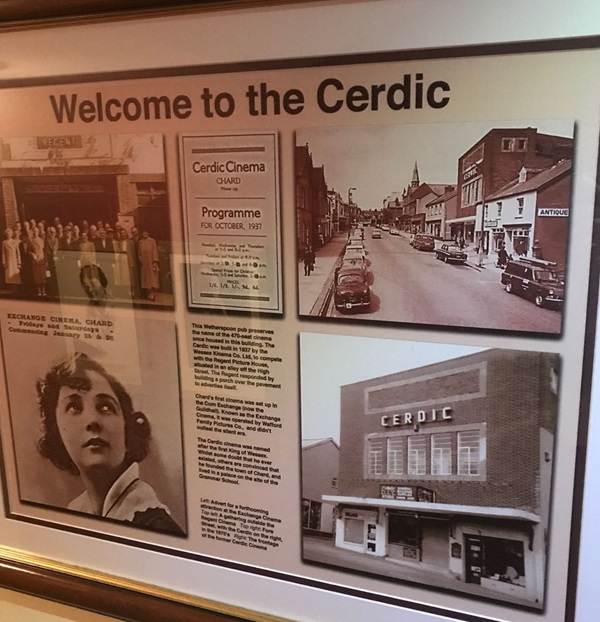
The text reads: This Wetherspoon pub preserves the name of the 470-seat cinema once housed in this building. The Cerdic was built in 1937 by the Wessex Kinema Co. Ltd, to compete with the Regent Picture House, situated in an alley off the High Street. The Regent responded by building a porch over the pavement to advertise itself.
Chard’s first cinema was set up in the Corn Exchange (now the Guildhall). Known as the Exchange Cinema, it was operated by Watford Family Pictures Co., and didn’t outlast the silent era.
The Cerdic cinema was named after the first King of Wessex. Whilst some doubt that he ever existed, others are convinced that he founded the town of Chard, and lived in a palace on the site of the Grammar School.
Left: Advert for a forthcoming attraction at the Exchange Cinema
Top left: A gathering outside the Regent Cinema
Top right: Fore Street with the Cerdic on the right, in the 1970s
Right: The frontage of the former Cerdic Cinema.
Photographs, prints and text about the first powered flight.
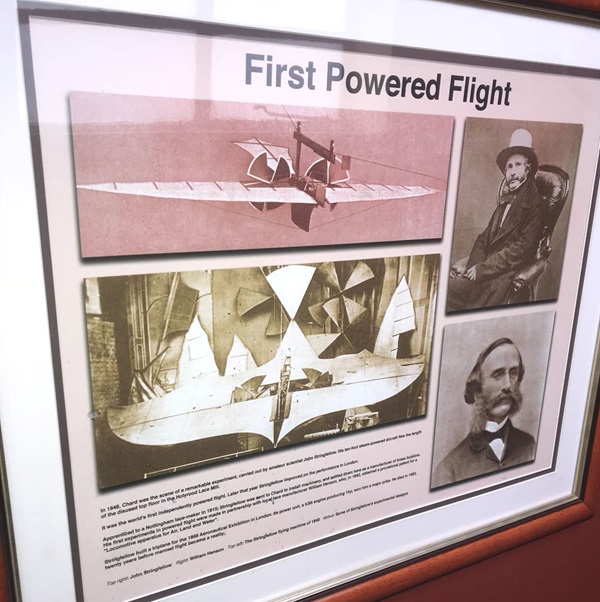
The text reads: In 1848, Chard was the scene of a remarkable experiment, carried out by John Stringfellow. His ten foot steam powered aircraft flew the length of the disused top floor in the Holyrood Lace Mill.
It was the world’s first independently powered flight. Later that year Stringfellow improved on the performance in London.
Apprenticed to a Nottingham lace-maker in 1815, Stringfellow was sent to Chard to install machinery and settled down here as a manufacturer of brass bobbins. His first experiments in powered flight were made in partnership with local lace manufacturer William Henson, who, in 1842, obtained a provisional patent for a ‘Locomotive apparatus for Air, Land and Water’.
Stringfellow built a triplane for the 1868 Aeronautical Exhibition in London. Its power unit, a 13lb engine, producing 1hp, won him a major prize. He died in 1883, twenty years before manned flight became a reality.
Top right: John Stringfellow
Right: William Henson
Top Left: The Stringfellow flying machine of 1848
Above: Some of Stringfellow’s experimental designs.
Photographs and text about Margaret Bondfield.
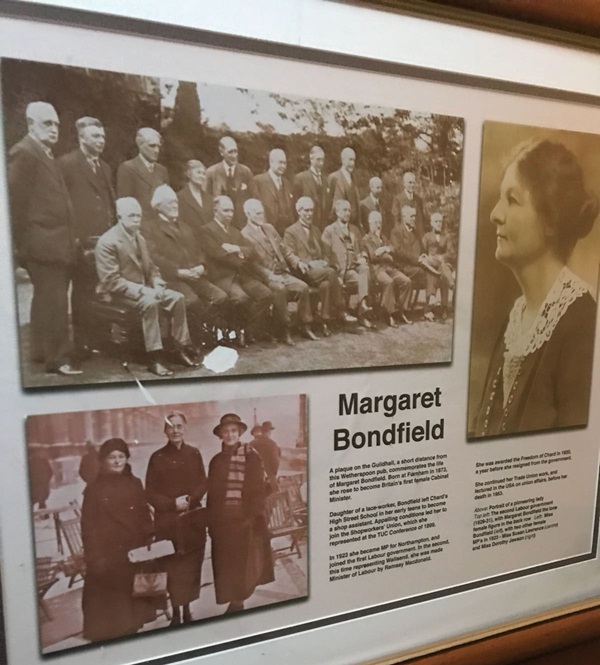
The text reads: A plaque on the Guildhall, a short distance from this Wetherspoon pub, commemorates the life of Margaret Bondfield. Born at Furnham in 1873, she rose to become Britain’s first female cabinet minister.
Daughter of a lace-worker, Bondfield left Chard’s High Street School in her early teens to become a shop assistant. Appalling conditions led her to join the Shopworkers’ Union, which she represented at the TUC conference of 1899.
In 1923 she became MP for Northampton, and joined the first Labour government. In the second, this time representing Wallsend, she was made minister of Labour by Ramsay Macdonald.
She was awarded the freedom of Chard in 1930, a year before she resigned from the government.
She continued her Trade Union work, and lectured in the USA on union affairs before her death in 1953.
Above: Portrait of a pioneering lady
Top Left: The second Labour government (1829-31), with Margaret Bondfield the lone female figure in the back row
Left: Miss Bondfield (left) with two other female MPs in 1923 – Miss Susan Lawrence (centre) and Miss Dorothy Jenson (right).
A print of James Gillingham - Chard shoemaker and a pioneer of artificial limbs.
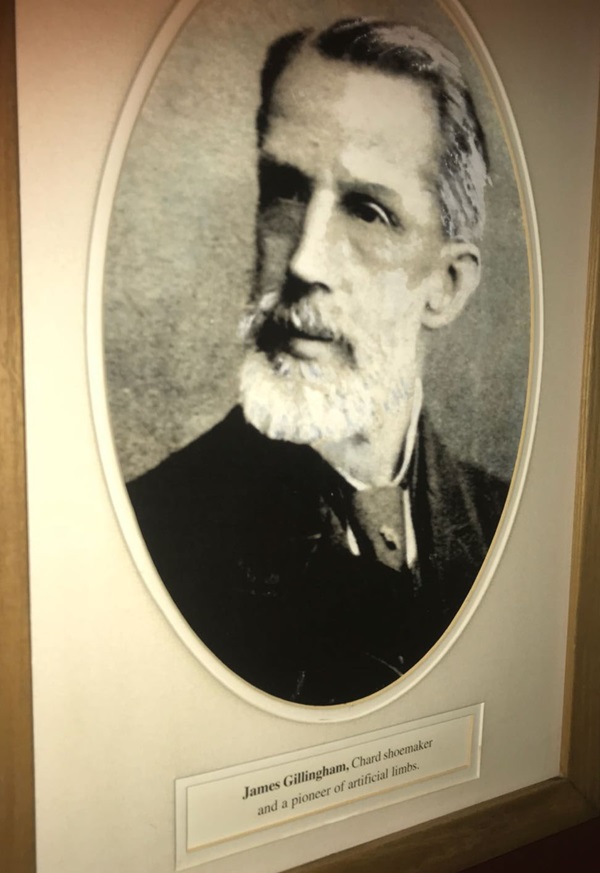
A photograph of Colonel Gifford (seated third left) and his senior workers.
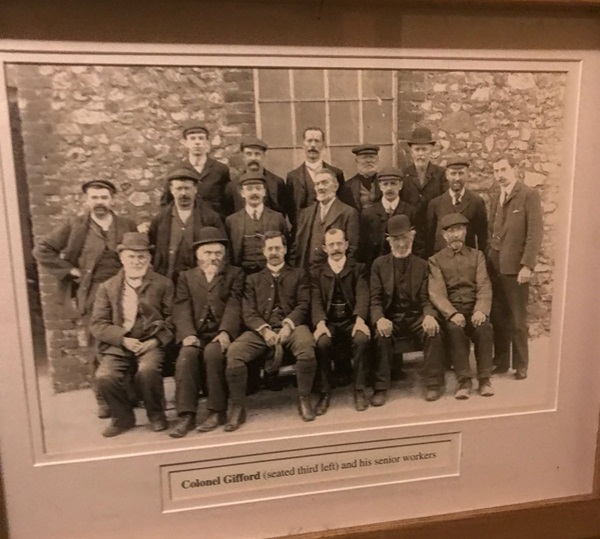
A photograph of the Cerdic cinema, and the opening programme of 1937.
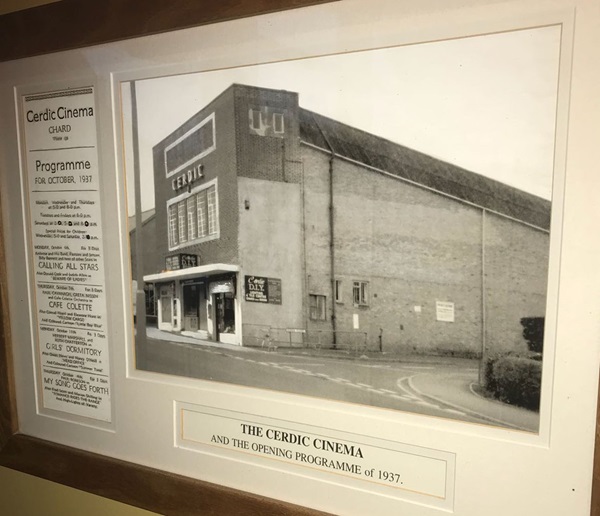
A photograph of the Cerdic cinema, and the programme for October 1987.
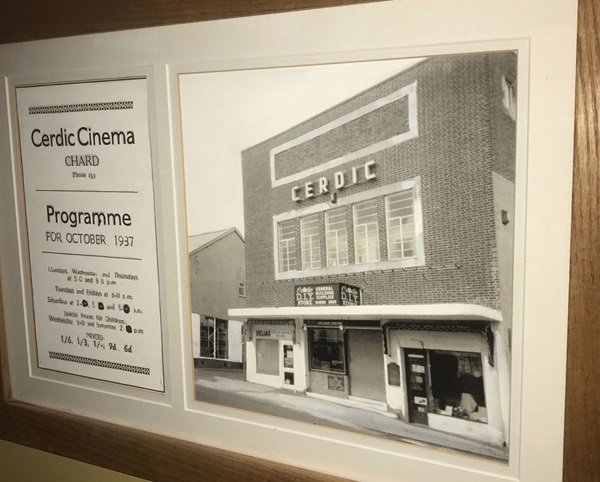
External photograph of the building – main entrance.

If you have information on the history of this pub, then we’d like you to share it with us. Please e-mail all information to: pubhistories@jdwetherspoon.co.uk